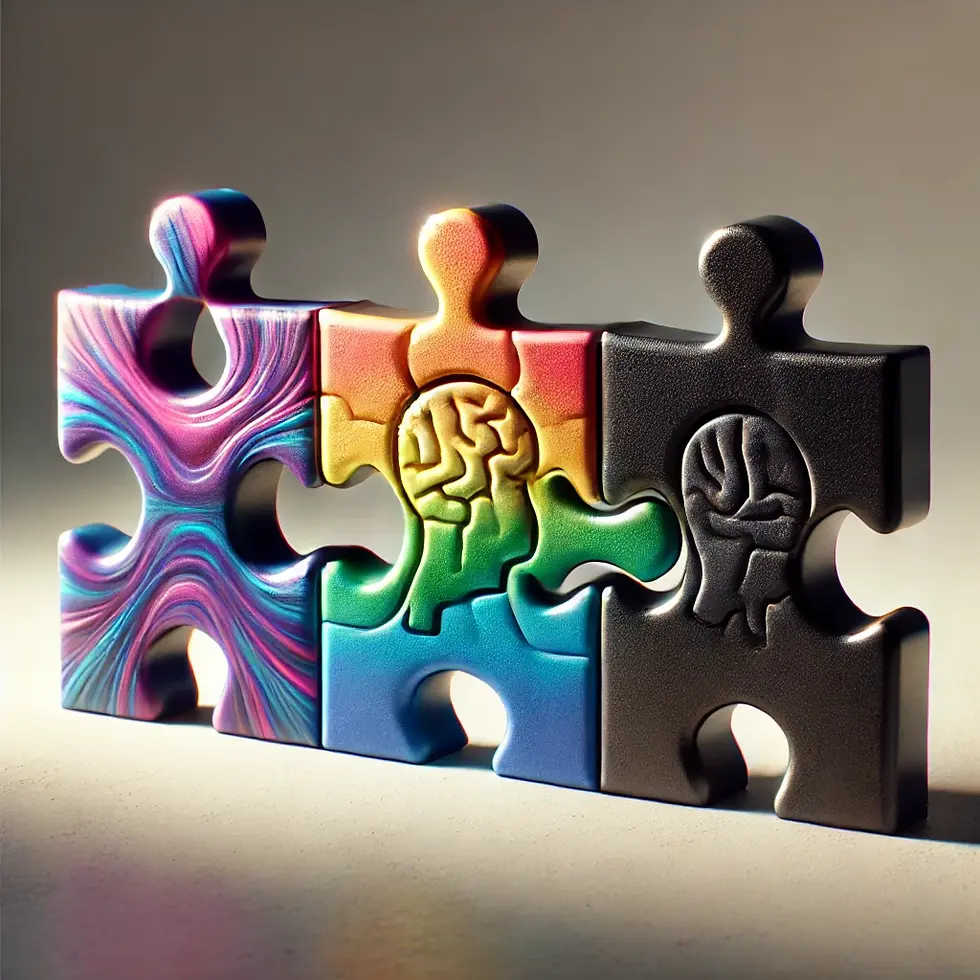The Problem with "Everyone Is a Little Neurodivergent!"
- Joanna Baars

- May 2, 2025
- 4 min read
Updated: Jun 17, 2025

You’ve probably heard it before, someone says (usually with a well-meaning laugh) "Oh I do that too, I must have ADHD," or "Well, everyone is a little bit autistic, aren't they." And whilst on the surface these comments might seem harmless or even inclusive, they often leave neurodivergent people feeling unseen, dismissed, or misunderstood. Because what’s being confused here is a common mistake: mixing up shared behaviours with shared processing systems.
Let’s take a step back. As humans, we all have behaviours that overlap. Everyone forgets things sometimes. Everyone gets overwhelmed or distracted. Everyone has quirks or routines they feel attached to. These are human traits. But what makes someone neurodivergent, like autism or ADHD, isn’t the behaviour alone. It’s the way their brain processes, responds to, and experiences the world that creates the foundation of their neurodivergence.
It can be tempting, especially for neurotypical people who are trying to relate, to latch onto that one shared moment, "Oh, I forget my keys too!" But there’s a difference between occasionally forgetting your keys because you had a lot on your mind, and having a brain that constantly struggles with executive functioning, time blindness, and working memory. The former is an experience. The latter is a persistent neurological pattern that impacts nearly every area of daily functioning. This distinction is important. It matters because when neurotypical people assume similarity based on surface-level behaviour, they often invalidate the actual depth of what neurodivergent people are experiencing. It can come across like, "You're not special," or worse, "You're making a fuss about nothing," even when that wasn't the intention.

Think of it this way: we wouldn't see a cat breathing and say, "Oh look, I breathe too, I must be a cat." That sounds ridiculous because, well, cats look different, sound different, and behave differently in many ways. They are after-all a different creature altogether. Neurodivergent people, however, are not. We are all human, and therefore all do human things. It's just that our processing, sensory experiences, and social interpretations may be vastly different. This is why those throwaway comments can feel so ableist, even when they’re said with the best of intentions. Because what’s being missed is the unseen part: the processing.
A neurotypical person might have a stressful day and find crowds overwhelming. An autistic person might experience that same crowd as consistently disorienting or even physically painful due to sensory processing differences. To an outsider, both might look like someone feeling anxious in a crowd. But the underlying cause, and what each person needs in order to feel safe, is entirely different. For someone with ADHD, being late, losing things, or zoning out isn’t about carelessness. It's often about brain chemistry, dysregulation, or how dopamine and executive function are impacted. It's not a decision to behave a certain way. It’s how the brain is wired. And that's not something someone can just decide to switch off. When a neurotypical person jokes about also being forgetful, it unintentionally suggests that ADHD behaviours are just personality quirks rather than part of a larger, complex neurological picture.
These misunderstandings often tie back to how we’re all conditioned to view the world, through our own lens. It’s human nature to assume others think, feel, and experience things similarly to us. But neurodivergence challenges that assumption. It asks us to go beyond what we can immediately see or relate to and instead practice curiosity and compassion. Because the truth is, neurodivergent people often already are doing this work. They spend so much time trying to understand neurotypical expectations, learning social rules, studying facial expressions, masking their authentic responses, just to feel included or avoid rejection. But that effort is rarely reciprocated. One of the most painful dynamics that emerges from this misunderstanding is the assumption that when neurodivergent people ask for space, clarity, or context, they’re making excuses. That when they communicate differently or respond in ways that aren’t expected, they’re being difficult. But what if, instead of assuming intent or drawing parallels from our own experiences, we slowed down enough to ask, "What might this person be experiencing that I can't see?"
I think it is still important to reassure anyone finding this article difficult or uncomfortable, that this isn’t about blaming neurotypical people. It’s about inviting reflection. It’s about recognising that we all have human traits, but not all of us process the world in the same way. And when we mistake those shared traits for shared inner experiences, we risk dismissing the unique challenges and strengths that come with neurodivergence.
So yes, maybe you also get overwhelmed sometimes, or forget things, or need quiet time. That doesn’t mean you have ADHD or autism. It means you’re human. And that’s the point. Neurodivergent people are human. They're not aliens. They're not broken. They're not dramatic. They're just trying to move through a world that often wasn’t built for the way their brains work. And when we start to recognise that, when we see behaviour as a surface symptom of something deeper rather than a shared truth, we open the door to empathy, respect, and more meaningful connection.
If something here resonated with you, I’d love to hear it.
Whether it brought clarity, stirred a feeling, or simply gave you a moment of pause, you're not alone. These conversations matter, and your voice is welcome.
💬 Feel free to leave a comment below or share this post with someone you think that it might help.
💌 Curious to explore more? You can browse other related articles or get in touch here.
Thank you for being here, exactly as you are.
Kindest Always.
Joanna Baars is a psychotherapist and writer based in London. Her work explores how we can learn to understand ourselves, in a complex world. Find out more...





Comments